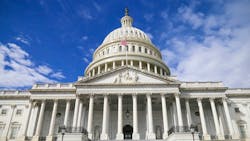Senate passes stimulus bill that includes $25 billion in emergency funding for transit agencies
The Senate and White House reached a deal on the Coronavirus Aid, Relief and Economic Security (CARES) Act that provides $2 trillion in aid to people and entities who have been impacted by the novel coronavirus pandemic.
The deal was reached at approximately 1:00 a.m. on March 25 and passed in the Senate at approximately 11:30 p.m. the same day. It now moves to the House of Representatives.
The current version of the bill includes $25 billion for public transit agencies in emergency appropriations. Should the legislation advance to be enacted, the funds would be managed through the Federal Transit Administration as grants and shared using fiscal year 2020 funding formulas.
The bill would also provide more than $1 billion for Amtrak, including $492 million in Northeast Corridor grants and $526 million for the national network.
The bill text says these emergency funds are “to prevent, prepare for and respond to coronavirus.” Language in the bill also states operating expenses related to the response to the pandemic is eligible for this funding. Additionally, transit agencies would be able to be reimbursed for operating costs accrued from Jan. 20, 2020, to maintain service and lost revenue due to the pandemic, including the purchase of personal protective equipment and paying administrative leave for operations personnel due to a reduction in service.
As major cities and states throughout the U.S. urge and mandate residents to stay at home, transit service providers have continued to operate, in most cases at reduced service levels, throughout the pandemic response to help transport essential personnel, such as medical staff and first responders, to work. The result has been a large financial hit in lost revenues and increased costs associated with increased cleaning.
Should the bill be approved by the House and be signed by the president, the apportionments would need to be distributed within seven days.
Bay Area Rapid Transit (BART), which said the loss of revenue has pushed it to a financial crisis, called the funds included in the bill a “critical lifeline” for systems across the country and urged the package’s swift advancement.
“For BART, these emergency funds can be the difference between needing to shut down when our reserves run out and maintaining service to keep the San Francisco Bay Area moving,” said BART General Manager Bob Powers. “Sixty percent of our operating budget is funded by fare revenue and we’ve sustained a 90 percent drop in ridership during this crisis. I want to thank everyone who has advocated for transit and BART specifically during these unprecedented times. There is more work to do and this is only one step towards keeping the trains running, but it is a significant down payment for the essential workers in the region and commuters when they return."
The Association of Public Transportation Association (APTA) President and CEO Paul P. Skoutelas applauded the bills progress and expressed gratitude for the bipartisan effort to get it moved through the Senate.
"Public transit is a critical lifeline for millions of Americans, and this legislation will provide much needed support to the transit systems working tirelessly to provide essential public transit services for health care workers, first responders, and grocery and pharmacy workers, as well as medical transportation for kidney dialysis, cancer treatments and other critical care," said Skoutelas. "We urge swift passage by the House of Representatives and signing of the bill by President Trump so that these funds can be distributed to transit systems as quickly as possible.”
-------------------
The full text of the bill is available through the Senate Committee on Appropriations.
About the Author

Mischa Wanek-Libman
Group Editorial Director
Mischa Wanek-Libman is director of communications with Transdev North America. She has more than 20 years of experience working in the transportation industry covering construction projects, engineering challenges, transit and rail operations and best practices.
Wanek-Libman has held top editorial positions at freight rail and public transportation business-to-business publications including as editor-in-chief and editorial director of Mass Transit from 2018-2024. She has been recognized for editorial excellence through her individual work, as well as for collaborative content.
She is an active member of the American Public Transportation Association's Marketing and Communications Committee and served 14 years as a Board Observer on the National Railroad Construction and Maintenance Association (NRC) Board of Directors.
She is a graduate of Drake University in Des Moines, Iowa, where she earned a Bachelor of Arts degree in Journalism and Mass Communication.
